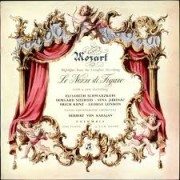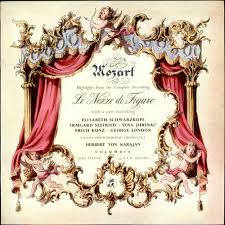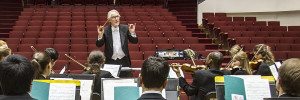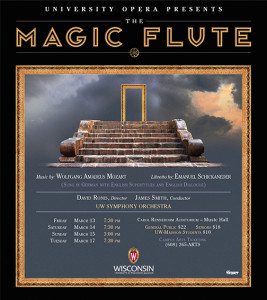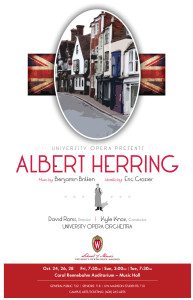January 31, 2017
Contacts:
David Ronis ronis@wisc.edu
Katherine Esposito kesposito@wisc.edu
Fresh from winning two major awards in the 2015-16 National Opera Association Competition, University Opera will present Benjamin Britten’s gothic ghost story, The Turn of the Screw, to round out its season. In this, Britten’s last chamber opera, based on the Henry James novella of the same title, terror takes unexpected forms. Premiered in 1954, The Turn of the Screw tells of a young governess who is hired to care for two children in an isolated country house in late 19th century England. She soon realizes that the children are haunted by secrets and spirits that harm them in very real ways and she takes it upon herself to defend them. In so doing, she is forced to confront the demons she perceives as threats, as well as her own internal ones.

Benjamin Britten in the mid-1960s (photograph by Hans Wild).
The Turn of the Screw will be presented in English for three performances, all with projected supertitles. March 3 at 7:30 PM, March 5 at 3:00 PM, and March 7 at 7:30 PM at Music Hall on the UW-Madison campus. David Ronis, inaugural Karen K. Bishop Director of University Opera, will direct and graduate conducting assistant Kyle Knox will conduct the 13-member chamber orchestra. Musical preparation will be by University Opera’s new vocal coach, Daniel Fung.
Tickets are $25.00 for the general public, $20.00 for senior citizens and $10.00 for UW-Madison students, available in advance through the Campus Arts Ticketing office at (608) 265-ARTS and online here.
Just as James’s novella is particularly notable for the ambiguity of its story, so is Britten’s opera. Are the ghosts real? Or are they creations of the Governess’s delusional mind? Are the children as innocent as they originally appear, or are they part of a larger, scheme of evil? What of Mrs. Grose, the housekeeper, who reveals some information, but not enough to form a coherent backstory? And the ghosts themselves – Peter Quint and Miss Jessel – what motivates them? What do they have at stake? All these questions hover as this compelling psychological thriller unfolds.
Following each performance of The Turn of the Screw, there will be a talkback session with the cast and members of the artistic staff. Audience members will be given the opportunity to ask questions and discuss the issues raised by this opera.
Leading the cast and alternating the role of the Governess will be Katie Anderson and Erin Bryan. Alec Brown will play the roles of the Prologue/Peter Quint, Anna Polum will be Miss Jessel and Cayla Rosché will be Mrs. Grose. Elisheva Pront and Emily Vandenberg will alternate as Flora and guest artists Simon Johnson and Amitabha Shatdal will share the role of Miles.
The production will be designed by Frank Schneeberger with lighting design by John Frautschy. Sydney Krieger and Hyewon Park will design costumes, Meg Huskin will be the assistant director, Holly Berkowitz the dramaturg, and the production stage manager will be Meghan Stecker. Other staff include Chan Mi Jean and Satoko Hayami, rehearsal pianists; Erin Bryan, operations manager for University Opera; Teresa Sarkela, scenic charge; and Ethan White, lighting board operator.
Tickets are $25.00 for the general public, $20.00 for senior citizens and $10.00 for UW-Madison students, available in advance through the Campus Arts Ticketing office at (608) 265-ARTS and online here.
Tickets may also be purchased in person at the Wisconsin Union Theater Box Office Monday-Friday, 11:30 a.m.-5:30 p.m. and Saturdays, 12:00-5:00 p.m. and the Vilas Hall Box Office, Monday-Friday, 11:30 a.m.-5:30 p.m., and after 5:30 p.m. on University Theatre performance evenings. Because shows often sell out, advance purchase is recommended.
If unsold tickets remain, they may be purchased at the door beginning one hour before the performance.
The Carol Rennebohm Auditorium is located in Music Hall, at the foot of Bascom Hill on Park Street.
University Opera is a cultural service of the Mead Witter School of Music at the University of Wisconsin-Madison, whose mission is to provide comprehensive operatic training and performance opportunities for our students and operatic programming to the community. For more information, please contact opera@music.wisc.edu. Or visit the School of Music’s web site at music.wisc.edu.

